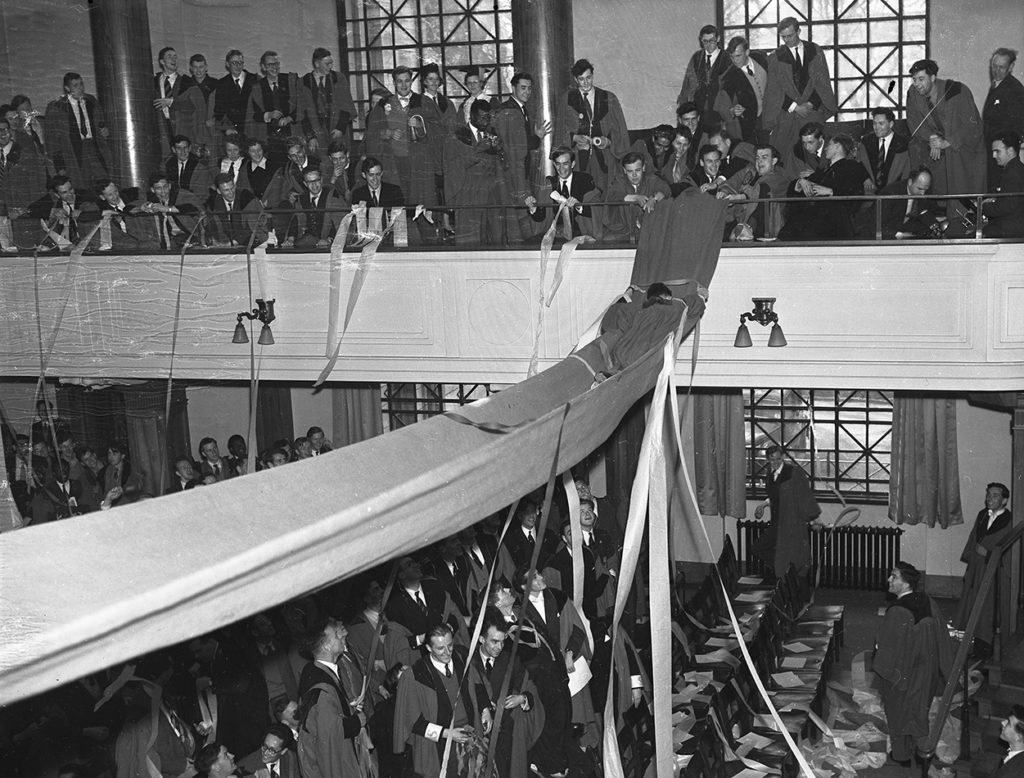The Lord Rector of the University of St Andrews is the President of University Court, and plays an informal, pastoral role for students. Since 1858, the Rector has been elected by students every 3 years. They are completely independent and external to the University, and represent the student community.
University Court is the highest governing body of the University. It exists to oversee the management of the University, with special emphasis on strategic leadership and accountability. The Principal leads the actual management of the University, but they are accountable to the Court, which comprises senior staff and a majority of unpaid, external, independent 'lay' members, meeting about four times a year. Court is the place where many University issues are decided: budget allocations, financial policies, academic policies, estate development and capital projects, staff and student provisions.
The Rector can open doors and help to release log-jams where the formals mechanisms for resolving issues appear to fail. A Rector with the time, sincerity and commitment to get to know the student body and engage with their issues, and the skills to influence effectively, can make a valuable contribution to the student experience, as well as to the life and reputation of the whole University.
Current Rector
Stella Maris is the current Rector, taking on the role in October 2023.
With her diverse background and unwavering commitment to student welfare, embraces the role of Rector of the University of St Andrews with both empathy and expertise. Born in Nigeria and relocating to England during her formative years, she achieved her MA (Hons) in English and Philosophy at St Andrews in 2023. Throughout her academic journey, Stella served for 2 and a half years as the Rector’s Assessor, delving deep into the intricate workings of St Andrews' unique governance and strategic mechanisms.
As Rector, Stella values her pastoral role, keenly aware of the nuanced position she holds. While her primary duty is to chair the Court, upholding good governance and ensuring the broader interests of the University, she remains firmly rooted in her commitment to student advocacy. Stella champions the student voice, ensuring it is both acknowledged and amplified, working in tandem with student representatives to ensure their concerns resonate within the University Court and beyond.
The role of the Rector, while largely impartial, serves as an essential bridge between the University's broader vision and the aspirations of its student community. In Stella's tenure, this equilibrium is pursued with dedication, fostering a space where student needs harmoniously align with the overarching objectives of the University of St Andrews.
 Stella Maris
Stella Maris
Contact
Rector's Assessor
Since 1970, the Rector has appointed a student as Rector's Assessor. This is a voluntary position, responsible for acting as a link between the Rector and the student body. The Assessor also provides aid and advice to the Rector, and sits on the University Court as a full member. The Assessor meets regularly with the Rector to advise on policy issues, discuss upcoming events and campaigns, and ensure the Rector has a coordinated media and web presence in St Andrews.
Find out more about the current Rector's Assessor.
Rector's Fund
The Rector's Fund is a grant scholarship, intended to support students pursuing a summer internship or project motivated by a desire to create positive change. To be eligible for the fund, you must be a matriculated student, and must have accepted an internship offer at the time of your application.
Scholarships are awarded based on financial need and demonstrated commitment to creating positive change.
To apply, go to the Applications tab of MySaint, navigate to Scholarships and Funding, and search for the Rector's Fund. Any questions should be sent to rector@.
The Rector’s Fund is made possible thanks to the generosity of HPM Consultants Ltd and The Lucky Club.
History
 Younger Hall during Lord Kilmuir’s installation, 1955.
Younger Hall during Lord Kilmuir’s installation, 1955.
Until the mid-19th Century, the Rector had to be a minister of the Church of Scotland. Then, claiming that this was incompatible with their oath to elect a rector ‘of great worth and fame’, the students sought to break the mould by electing Sir Walter Scott in 1825 – an election which was immediately declared null and void.
One of the first rectors to be elected after the 1858 Act was John Stuart Mill, who helped himself to a concept of rector as ‘honorary president’ (more the intended style of the Chancellor’s post). He made one speech and then disappeared for all of his three year term.
For the rest of the 19th century, many of the rectors were senior politicians from conservative and liberal parties. Then there followed a succession of great public figures, including wealthy benefactors such as the Marquess of Bute and Andrew Carnegie; statesmen like Lord Avebury and the Earl of Rosebery; Field Marshall Haig during the First World War; writers such as J. M. Barrie and Rudyard Kipling in the 1920s; and Jan Christiaan Smuts and Marchese Marconi in the 1930s. These men increasingly adopted the style of Mill, appearing once only in their term as rector.
Installation
The day before the Installation is filled with student-led celebrations under the title of ‘The Drag’. The Rector is ‘delivered’ into town by a novel form of transport, and is then drawn in an ancient carriage, pulled by University Blues, to a series of 12-15 hostelries where student groups, clubs, and societies are deployed to introduce themselves and their activities, buy the Rector a drink, and offer a relevant gift as a memento of the occasion.
The Drag ends with a reception at the Student Union building, followed by a torchlight procession from St Salvator’s Quad to the end of the pier, and indefinite further revelling in the town’s bars.
Previous Rectors
| |
Name |
Years served |
| 1 |
Sir Ralph Anstruther of Balcaskie, 4th Bt. |
1859-1862 |
| 2 |
William Stirling-Maxwell of Keir, MP |
1862-1865 |
| 3 |
John Stuart Mill |
1865-1868 |
| 4 |
James Anthony Froude |
1868-1871 |
| 5 |
Charles, Lord Neaves |
1872-1874 |
| 6 |
Arthur Penryhn Stanley, Dean of Westminster |
1874-1877 |
| 7 |
Roundell Palmer, Lord Selborne |
1877-1880 |
| 8 |
Sir Theodore Martin |
1880-1883 |
| 9 |
Donald James Mackay, 11th Lord Reay |
1884-1886 |
| 10 |
Arthur James Balfour of Whittinghame |
1886-1889 |
| 11 |
Frederick Temple Hamilton-Temple-Blackwood, 1st Marquess of Dufferin and Ava |
1889-1892 |
| 12 |
John Patrick Crichton-Stuart, 3rd Marquess of Bute |
1892-1898 |
| 13 |
James Stuart, MP |
1898-1901 |
| 14 |
Andrew Carnegie of Skibo |
1901-1907 |
| 15 |
John Lubbock, 1st Lord Avebury |
1907-1910 |
| 16 |
Archibald Philip Primrose, 5th Earl of Roseberry |
1910-1913 |
| 17 |
John Campbell Gordon, 1st Marquess of Aberdeen |
1913-1916 |
| 18 |
Sir Douglas Haig |
1916-1919 |
| 19 |
Sir James Matthew Barrie |
1919-1922 |
| 20 |
Rudyard Kipling |
1922-1925 |
| 21 |
Fridtjof Nansen |
1925-1928 |
| 22 |
Sir Wilfred Thomason Grenfell |
1928-1931 |
| 23 |
Jan Christian Smuts |
1931-1934 |
| 24 |
Guglielmo Marconi, Marchese Marconi |
1934-1937 |
| 25 |
Robert MacGregor Mitchell, Lord MacGregor Mitchell |
1937-1938 |
| 26 |
Sir David Munro |
1938-1946 |
| 27 |
Sir George Cunningham |
1946-1949 |
| 28 |
David George Brownlow Cecil, Lord Burghley |
1949-1952 |
| 29 |
David Robert Alexander Lindsay, 28th Earl of Crawford |
1952-1955 |
| 30 |
David Patrick Maxwell-Fyfe, 1st Viscount of Kilmuir |
1955-1958 |
| 31 |
Robert John Graham Boothby, Lord Boothby |
1958-1961 |
| 32 |
Charles Percy Snow, Lord Snow |
1961-1964 |
| 33 |
Sir John Knewstub Maurice Rothenstein |
1964-1967 |
| 34 |
Sir Learie Constantine, Lord Constantine of Maraval and Nelson |
1967-1970 |
| 35 |
John Cleese |
1970-1973 |
| 36 |
Alan Coren |
1973-1976 |
| 37 |
Frank Muir |
1976-1979 |
| 38 |
Tim Brooke-Taylor |
1979-1982 |
| 39 |
Katharine Whitehorn |
1982-1985 |
| 40 |
Stanley Adams |
1985-1988 |
| 41 |
Nicholas Parsons |
1988-1991 |
| 42 |
Nicholas Campbell |
1991-1993 |
| 43 |
Donald Findlay |
1993-1999 |
| 44 |
Andrew Neil |
1999-2002 |
| 45 |
Sir Clement Freud |
2002-2005 |
| 46 |
Simon Pepper |
2005-2008 |
| 47 |
Kevin Dunion |
2008-2011 |
| 48 |
Alistair Moffat |
2011-2014 |
| 49 |
Catherine Stihler |
2014-2017 |
| 50 |
Srdja Popovic |
2017-2020 |
| 51 |
Leyla Hussein OBE |
2020-2023 |
| 51 |
Stella Maris |
2023-Present |